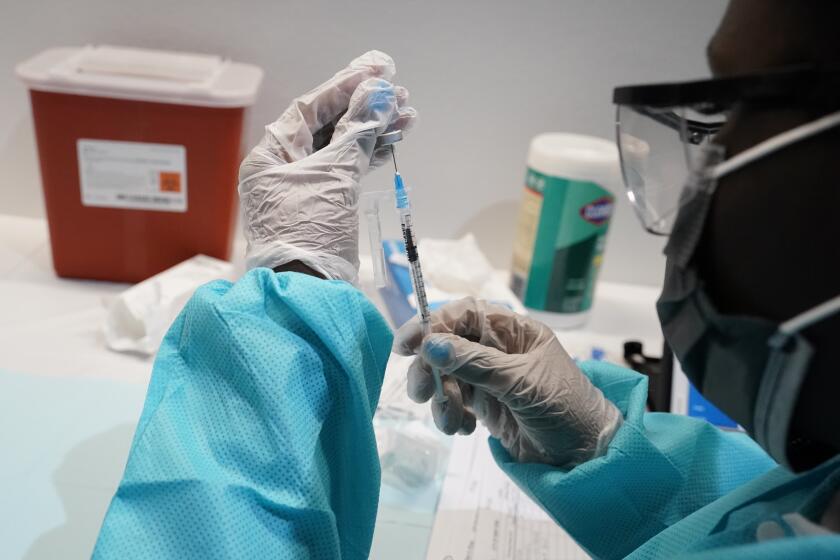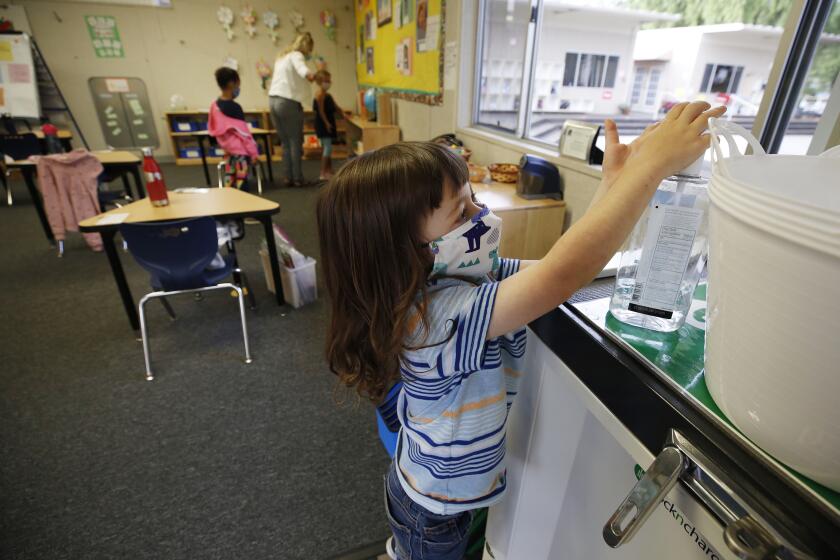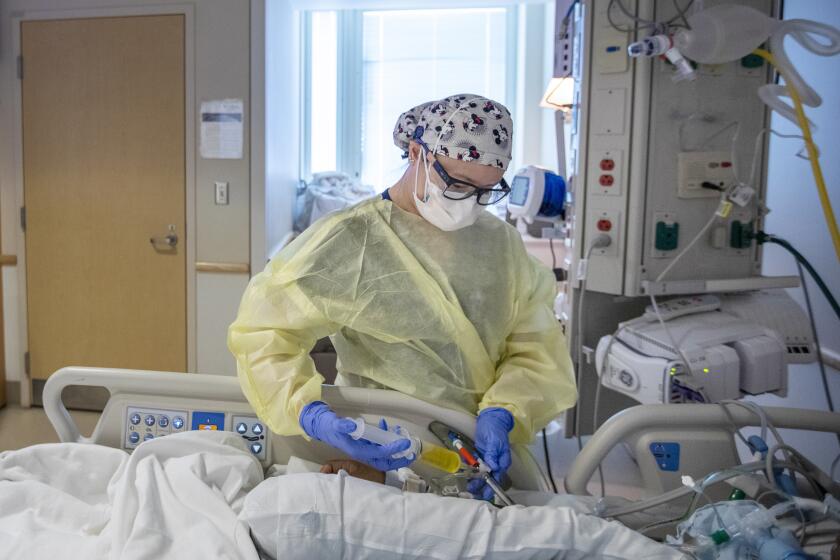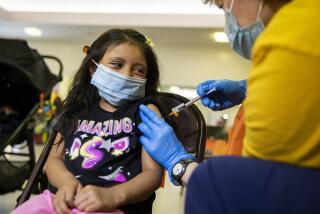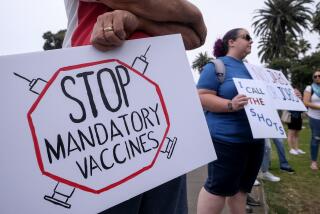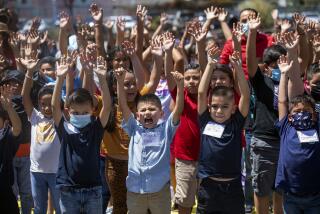When parents are vaccinated against COVID-19, protection extends to their kids
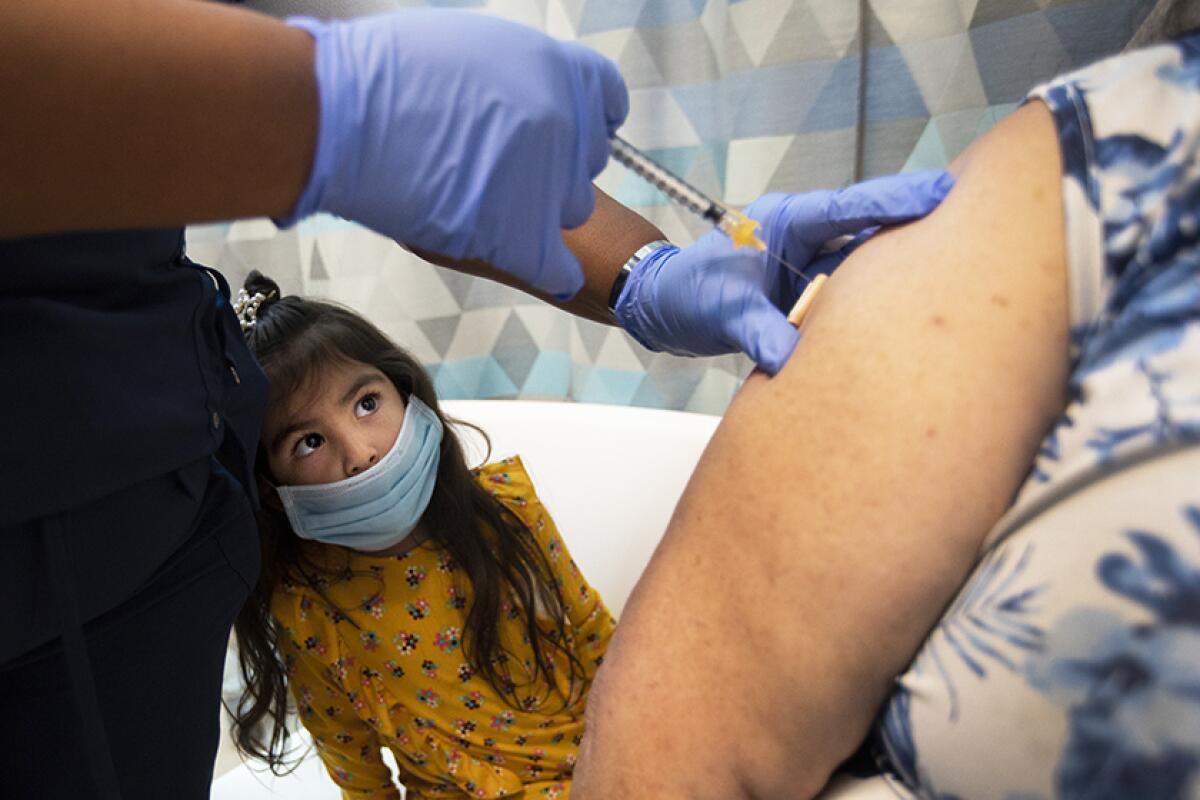
- Share via
With COVID-19 as with life: When parents take a few jabs, their kids gain protection.
New research from Israel shows that unvaccinated children whose mothers and fathers were fully vaccinated not only had parents who were far less likely to fall ill with COVID-19, their risk of being infected was lower as well.
That protection was seen against both the Alpha and Delta variants of the coronavirus. With Delta in particular, the protection was strongest when parents had gotten a booster shot.
The new findings, published Thursday in the journal Science, underscore the importance of “household transmission” in sustaining the pandemic, as well as the indirect role that vaccination can play in protecting a community’s most vulnerable members.
It’s parenting advice that may prompt a few of the 30 million unvaccinated American adults to seek out a shot, and the 47 million vaccinated adults who’ve not yet gotten a booster to roll up their sleeves yet again.
“If the individuals we happen to be speaking with are very child-focused, then some of this may persuade and reassure them,” said Dr. William Schaffner, a specialist in infectious diseases at Vanderbilt University.
Schaffner said he routinely tries to convince the vaccine-hesitant that if they will not get vaccinated for themselves, they should do it for their families and communities. But with the attitudes of holdouts hardening, he said, most now decline the appeal and insist their kids will remain unvaccinated too.
A new poll shows that most Americans who haven’t been vaccinated against COVID-19 say they are unlikely to get the shots.
In two very different phases of the pandemic, the research shows that children’s health relied heavily on indirect vaccine effects: For starters, vaccinated parents were less likely to bring the coronavirus into the household. And when they did, the vaccine appeared to make those parents less likely to pass it on to their unvaccinated children.
Stanford pediatrician Dr. Yvonne Maldonado said that for those who continue to question the need to be vaccinated, the Israeli research offers strong evidence for its broader value. It shows that beyond self-protection, the decision to get vaccinated is “especially important in protecting our most vulnerable members, such as children under 5 who cannot themselves be vaccinated,” Maldonado said.
Though children are less likely to become severely ill with COVID-19, the U.S. Centers for Disease Control and Prevention estimates that 1,210 Americans under 18 have died of the disease, including 387 who were 4 and under. The Food and Drug Administration is not expected to give its emergency authorization to any vaccines for these youngest Americans before March.
Older kids also remain largely unprotected. While a pediatric version of the Pfizer-BioNTech vaccine was authorized for emergency use in late October, only 20.7% of 5- to 11-year-olds are fully vaccinated. In November, a Kaiser Family Foundation survey found that roughly 30% of parents with kids in this age group said they will definitely not get their child vaccinated, and 7% say they would do so only if their school requires it. Another third said they wanted to wait and see how the vaccine is working before making up their minds.
Meanwhile, 55.6% of U.S. adolescents ages 12 to 17 have received two doses of the regular Pfizer vaccine.
COVID case numbers are still going up. Kids under 5 won’t be eligible for vaccination for months. How can parents make smart decisions in the meantime?
For the new study, researchers studied close to 232,000 Israeli households with unvaccinated children during two 10-week periods of the pandemic. During last winter’s wave of infections involving the Alpha variant, they found that unvaccinated children (most of whom were 15 and under) were 72% less likely to become infected when both parents were vaccinated than when neither was.
When the more-transmissible Delta variant swept across Israel late last summer, unvaccinated children (by then mostly 10 and under) were 58% less likely to get infected if both parents had had three doses of vaccine than were their peers whose vaccinated parents had not yet gotten a booster.
The researchers made clear that the protection they saw would probably also extend to older household members, and to those with conditions that weakened their immune systems, leaving them vulnerable to COVID-19.
They added that their findings validate long-held beliefs about the role of vaccines in fostering “herd immunity”: that as a larger proportion of a community gets vaccinated, transmission will fall and even the unvaccinated will gain indirect protection from becoming ill.
“Herd immunity also works at the household level,” said Dr. Paul Offit, a vaccine specialist at Children’s Hospital of Philadelphia. “If you have a critical number of people in the home who are vaccinated, that works to slow the virus’ transmission.”
For those with an immune-compromised family member or an unvaccinated child at home, “you want to put a protective moat around him” by surrounding the individual with vaccinated people, Offit added.
An additional 91 COVID-19 deaths were reported in L.A. County on Wednesday, the second-highest daily total of the Omicron surge. One of the deaths was a 15-month-old.
In the study, having even one parent who remained unvaccinated or incompletely vaccinated put children at “substantially larger” risk of becoming infected. In cases where one parent was fully vaccinated and the other parent was not, vulnerable kids saw only marginal reductions in their chances of becoming infected: by 26% with the Alpha variant and 21% with the Delta variant.
The results build on other studies that have shown vaccination protects people beyond the individual who gets the jab. One Israeli study found unvaccinated spouses of healthcare workers were protected by their spouse’s vaccination. Another measured vaccination rates in close to 200 geographical communities in Israel, showing that as they rose, infections among unvaccinated youngsters consistently dropped.
“This is a simple matter of common sense,” Offit said. It would be a persuasive selling point “in a world dominated by logic and reason, but sadly, we don’t live in that world,” he added. “People at this point are pretty much locked in.”
